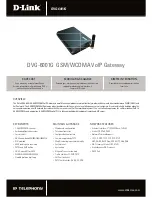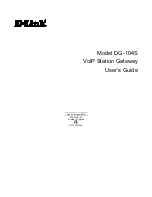
Chapter 9 Quality of Service (QoS)
LTE-5121 User’s Guide
110
Classification Order
Select an existing number for where you want to put this classifier to move the
classifier to the number you selected after clicking Apply.
Select Last to put this rule in the back of the classifier list.
Forward to
Interface
Select a WAN interface through which traffic of this class will be forwarded out.
If you select Unchange, the LTE Device forward traffic of this class according
to the default routing table.
DSCP Mark
This field is available only when you select the Ether Type check box in
Criteria Configuration-Basic section.
If you select Mark, enter a DSCP value with which the LTE Device replaces the
DSCP field in the packets.
If you select Unchange, the LTE Device keep the DSCP field in the packets.
To Queue
Select a queue that applies to this class.
You should have configured a queue in the Queue Setup screen already.
Criteria Configuration
Use the following fields to configure the criteria for traffic classification.
Basic
From Interface
Select whether the traffic class comes from the LAN or a wireless interface.
Ether Type
Select a predefined application to configure a class for the matched traffic.
If you select IP or IPv6 you also need to configure source or destination MAC
address, IP address, DHCP options, DSCP value or the protocol type.
Source
MAC Address
Select the check box and enter the source MAC address of the packet.
MAC Mask
Type the mask for the specified MAC address to determine which bits a
packet’s MAC address should match.
Enter “f” for each bit of the specified source MAC address that the traffic’s MAC
address should match. Enter “0“ for the bit(s) of the matched traffic’s MAC
address, which can be of any hexadecimal character(s). For example, if you set
the MAC address to 00:13:49:00:00:00 and the mask to ff:ff:ff:00:00:00, a
packet with a MAC address of 00:13:49:12:34:56 matches this criteria.
IP Address
Select the check box and enter the source IP address in dotted decimal
notation. A blank source IP address means any source IP address.
IP Subnet Mask
Enter the source subnet mask.
IPv6 Address
Select the check box and enter the source IPv6 address in dotted decimal
notation. A blank source IP address means any source IP address.
Prefix length
Enter the source IPv6 prefix length.
Port Range
If you select TCP or UDP in the IP Protocol field, select the check box and
enter the port number(s) of the source.
Exclude
Select this option to exclude the packets that match the specified criteria from
this classifier.
Destination
MAC Address
Select the check box and enter the destination MAC address of the packet.
Table 37
Class Setup: Add/Edit (continued)
LABEL
DESCRIPTION
Summary of Contents for LTE5121
Page 4: ...Contents Overview LTE 5121 User s Guide 4...
Page 12: ...Table of Contents LTE 5121 User s Guide 12...
Page 13: ...13 PART I User s Guide...
Page 14: ...14...
Page 22: ...Chapter 1 Introduction LTE 5121 User s Guide 22...
Page 28: ...28...
Page 42: ...Chapter 4 Broadband LTE 5121 User s Guide 42...
Page 70: ...Chapter 5 Wireless LTE 5121 User s Guide 70...
Page 98: ...Chapter 7 Static Route LTE 5121 User s Guide 98...
Page 102: ...Chapter 8 DNS Route LTE 5121 User s Guide 102...
Page 114: ...Chapter 9 Quality of Service QoS LTE 5121 User s Guide 114...
Page 138: ...Chapter 14 Parental Control LTE 5121 User s Guide 138...
Page 148: ...Chapter 15 Certificates LTE 5121 User s Guide 148...
Page 151: ...Chapter 16 VPN LTE 5121 User s Guide 151 Figure 104 IPSec VPN Add...
Page 162: ...Chapter 16 VPN LTE 5121 User s Guide 162...
Page 198: ...Chapter 19 User Account LTE 5121 User s Guide 198...
Page 214: ...Chapter 26 Backup Restore LTE 5121 User s Guide 214...
Page 224: ...Chapter 28 Troubleshooting LTE 5121 User s Guide 224...
Page 234: ...Index LTE 5121 User s Guide 234...
















































